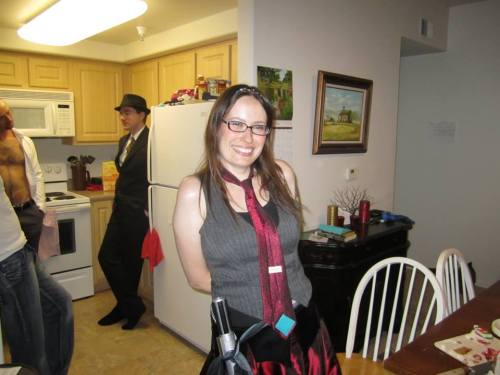Lately I’ve been feeling like a bad feminist.
It kicked up a gear last month when my feminist book club read Feminism is for Everyone, by bell hooks. I learned a lot from the book, but the entire time I was reading it, I was thinking, “Wow, I feel like I’m really falling short, and I don’t even really understand how.” It talked about raising consciousness, and I’m pretty sure my consciousness is completely NOT raised. Whatever that means.
This month we’re reading Bad Feminist, by Roxane Gay, which is making for a nice change of pace. Roxane Gay is smart and insightful and funny, and she also seems like she isn’t perfect, which is reassuring since I am also far from perfect.
For example, I have this fascination with eye makeup. It all started when my friend was visiting this coast from Boston, and the friends he was staying with invited me to stay for dinner. It was a lovely evening of good food and even better company, but I kept being distracted by the woman’s eyelashes. She had AMAZING eyelashes. And I was sitting there at the table, wondering if she glued on fake eyelashes every morning or if she was able to work these wonders with mascara, and if so, why had I never been able to work similar wonders with mascara?
Thus began my fascination. It started with mascara experimentation, but after some months I branched out to an interest in eyeliner and different colors of eye shadow. And a few weeks ago I took a field trip to Sephora and obtained this fat eyeliner pencil that is a modern wonder of cosmetics.
And every time I play with eye makeup, I know I’m probably being a bad feminist. I’m propagating a certain ideal of feminine beauty, and I guess as a feminist I’m supposed to deliberately subvert that ideal, and I don’t. I get almost as annoyed when people imply I shouldn’t wear makeup as I do when people imply I must wear makeup. I want to look the way I want to look, and I want to wear what I want to wear, and I don’t want to care about the messages I’m sending or the subconscious misogynistic ideas I’ve no doubt internalized over the years. And so I wear makeup when I feel like wearing makeup.
Also, when I’m on a date with a guy, I allow him to pay. I’m pretty sure a good feminist would not do this. My rule is never assume, but accept graciously. I cannot pretend that this is motivated by anything but self-interest. I don’t want to get into an argument about who’s paying for dinner (conflict adverse, me?), and also, it’s really nice when someone buys you dinner. The allure of free food and being fed, which to all rights should have died down after college, remains strong. The allure of being treated remains strong. It’s also super unfair, and I know this, and yet. I accept graciously.
Even my language is suspect, and for a writer, this is inexcusable. I like to say and write “you guys.” I like to say, “Man.” I know a good feminist would never say or write these things. And I do try to avoid this gendered language sometimes, especially in tweets. But there aren’t any good alternatives! I’ve tried “you all,” but I’m not from Texas and I’ll never be from Texas. “You people” is horrible. “Friends” sometimes works, but not always. And the best substitutes for “Man” are all profanity. So I have to choose between saying “Man” and swearing a lot.
I imagine if I had my consciousness raised, I wouldn’t do any of these things. I’d effortlessly never say “you guys” and I wouldn’t wear any makeup EVER EVER and I’d insist on going Dutch every single time. So where does this leave me?
I guess it leaves me far from perfect. But that doesn’t mean feminism isn’t important to me. That doesn’t mean being a feminist isn’t part of my identity. I think what it really means is that I’m human and flawed and complicated, and aren’t we all?
You guys, I’m a bad feminist. But even so, I’d rather be a bad feminist grappling with these issues than not be a feminist at all.





 Through Anne’s story, we get a glimpse of a better world. One of the recurring plots in the first three novels (those are the ones I’ve read over and over because I can’t quite handle the idea of Anne grown up after college) is how Anne affects the people around her. She meets people who at first glance are difficult and curmudgeonly, and she influences them for good. She has such an open, kind heart herself, and she spreads it to the people with whom she interacts. She charms people with her refreshing sincerity and genuine good will, and she brings out the best in them. In the world of Anne of Green Gables, kindness and good intentions prevail.
Through Anne’s story, we get a glimpse of a better world. One of the recurring plots in the first three novels (those are the ones I’ve read over and over because I can’t quite handle the idea of Anne grown up after college) is how Anne affects the people around her. She meets people who at first glance are difficult and curmudgeonly, and she influences them for good. She has such an open, kind heart herself, and she spreads it to the people with whom she interacts. She charms people with her refreshing sincerity and genuine good will, and she brings out the best in them. In the world of Anne of Green Gables, kindness and good intentions prevail.




